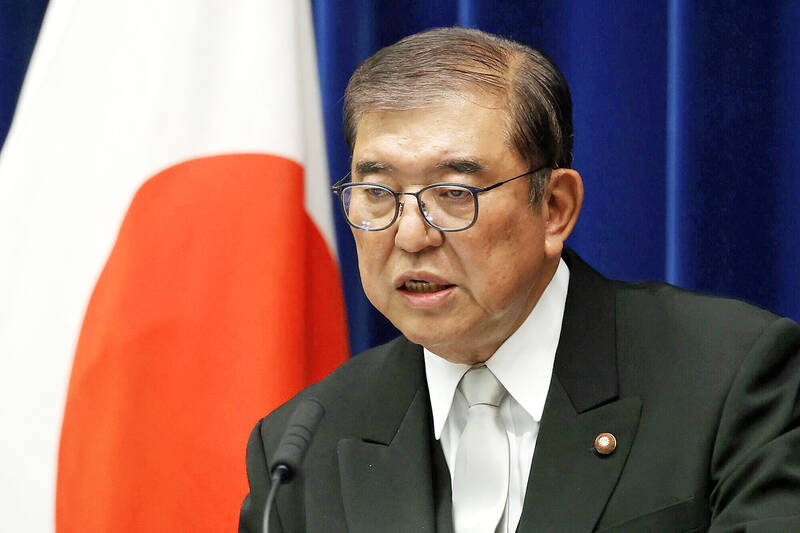Japanese Prime Minister Shigeru Ishiba pledged more than US$64.9 billion of fresh support for the nation’s semiconductor and artificial intelligence (AI) sector as Tokyo seeks to keep up with a global spending spree on cutting-edge technology.
Ishiba said he hoped public aid of more than ¥10 trillion (US$64.91 billion) for the sector by fiscal 2030 would serve as a catalyst to generate public and private investment of more than ¥50 trillion over the next 10 years.
The new funding framework, separate from previously earmarked funds of about ¥4 trillion, would be sketched out in an upcoming economic stimulus package with an aim to generate an economic impact of about ¥160 trillion, a draft of the package seen by Bloomberg showed.

Photo: Bloomberg
The additional funding would help Tokyo narrow the gap with global powers on chip support. The US and its allies are racing to keep ahead of China in AI-powering semiconductor capabilities, a domain that policymakers view as essential for economic security.
Tokyo’s ramping up of support for the sector is also based on the need to fuel economic growth at the national and regional levels.
Speaking at a news briefing on Monday after winning a vote in parliament to remain prime minister, Ishiba said he wanted to spread positive examples of regional revitalization such as Taiwan Semiconductor Manufacturing Co’s (TSMC, 台積電) chip plant in Kumamoto Prefecture across the nation.
Global chip demand is expected to triple to ¥150 trillion over the next 10 years, and the framework aims to provide public aid of more than ¥10 trillion through methods including outsourcing, financial support and legislative measures to boost predictability for private companies, according to the draft.
A previous goal of reaching ¥10 trillion in chip-sector investment set by former Japanese prime minister Fumio Kishida relied on private sector support in addition to public money.
Under Kishida, Japan already earmarked about ¥4 trillion in extra budgets to revive its chip sector, including ¥920 billion for Rapidus Corp in Hokkaido. Rapidus aims to mass produce advanced logic chips by 2027.
The new framework would be separate from the ¥4 trillion, Japanese Minister of Economy, Trade and Industry Yoji Muto said yesterday.
“Chips are not limited to Rapidus,” Muto said. “The process will be about considering how we will approach the next-generation semiconductor market from now on.”
The government would not raise taxes to fund the new framework, Muto said, adding that details are still being hammered out.
Ishiba said he would discuss the funding of the plans with ministries, but he would not pay for the measures through deficit-financing bonds.
Earlier local media reports suggested the government was looking for a new way of providing funding for Japan’s semiconductor sector. Ishiba’s government is planning to issue bonds backed by assets it holds, including NTT Corp shares, to provide subsidies to semiconductor companies, the Nikkei reported on Nov. 1.

The US dollar was trading at NT$29.7 at 10am today on the Taipei Foreign Exchange, as the New Taiwan dollar gained NT$1.364 from the previous close last week. The NT dollar continued to rise today, after surging 3.07 percent on Friday. After opening at NT$30.91, the NT dollar gained more than NT$1 in just 15 minutes, briefly passing the NT$30 mark. Before the US Department of the Treasury's semi-annual currency report came out, expectations that the NT dollar would keep rising were already building. The NT dollar on Friday closed at NT$31.064, up by NT$0.953 — a 3.07 percent single-day gain. Today,

‘SHORT TERM’: The local currency would likely remain strong in the near term, driven by anticipated US trade pressure, capital inflows and expectations of a US Fed rate cut The US dollar is expected to fall below NT$30 in the near term, as traders anticipate increased pressure from Washington for Taiwan to allow the New Taiwan dollar to appreciate, Cathay United Bank (國泰世華銀行) chief economist Lin Chi-chao (林啟超) said. Following a sharp drop in the greenback against the NT dollar on Friday, Lin told the Central News Agency that the local currency is likely to remain strong in the short term, driven in part by market psychology surrounding anticipated US policy pressure. On Friday, the US dollar fell NT$0.953, or 3.07 percent, closing at NT$31.064 — its lowest level since Jan.

The New Taiwan dollar and Taiwanese stocks surged on signs that trade tensions between the world’s top two economies might start easing and as US tech earnings boosted the outlook of the nation’s semiconductor exports. The NT dollar strengthened as much as 3.8 percent versus the US dollar to 30.815, the biggest intraday gain since January 2011, closing at NT$31.064. The benchmark TAIEX jumped 2.73 percent to outperform the region’s equity gauges. Outlook for global trade improved after China said it is assessing possible trade talks with the US, providing a boost for the nation’s currency and shares. As the NT dollar

The Financial Supervisory Commission (FSC) yesterday met with some of the nation’s largest insurance companies as a skyrocketing New Taiwan dollar piles pressure on their hundreds of billions of dollars in US bond investments. The commission has asked some life insurance firms, among the biggest Asian holders of US debt, to discuss how the rapidly strengthening NT dollar has impacted their operations, people familiar with the matter said. The meeting took place as the NT dollar jumped as much as 5 percent yesterday, its biggest intraday gain in more than three decades. The local currency surged as exporters rushed to